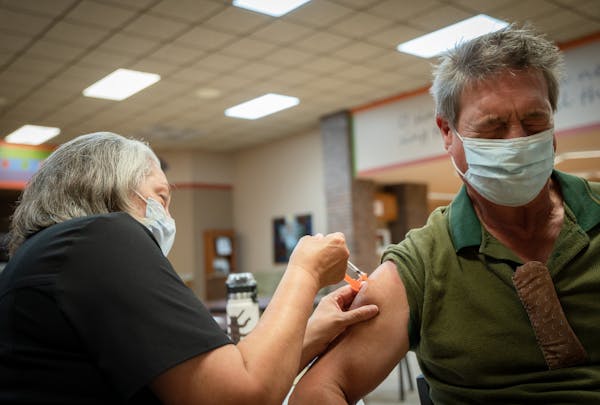The highly transmissible COVID-19 delta variant is responsible for an estimated 75% of Minnesota's new cases, according to the state's infectious disease director.
As has happened across the United States and in many countries, delta has become the dominant form of the virus, fueling a COVID-19 surge in places with low vaccination rates.
New infections are accelerating in Minnesota but not at the pace seen in other states. However, the ability of the delta variant to spread rapidly could change the picture.
"In terms of our case numbers we are technically in a good place," said Kris Ehresmann, who leads the infectious disease division at the Minnesota Department of Health.
"We are in a place that is very concerning to me," she added. "Cases are trending upward with a variant that is far more transmissible."
Although Minnesota is inching slowly toward its goal of vaccinating 70% of those 16 and older with at least one shot, 47% of the state's total population is not fully vaccinated, including children who are not yet eligible for the COVID-19 vaccine.
The Centers for Disease Control and Prevention said Tuesday that the delta variant accounts for 83% of new cases nationwide.
Arkansas and Missouri are among the COVID-19 hot spots, which include Florida, Louisiana, Nevada, Utah and Wyoming, according to a report Tuesday by the CDC.
Some "states are doing worse now than they've ever done," said Dr. Eric Topol, founder and director of the Scripps Research Translational Institute in La Jolla, Calif.
"We don't know how it is going to peak out," he said. "We've got counties in the U.S. now that have as low as 15 percent vaccination rates."
About 45% of the adult population in Arkansas is fully vaccinated, providing fertile ground for the delta variant.
All but one of Arkansas' 75 counties are experiencing substantial or high transmission rates, as well as all 13 metropolitan areas in the state, according to the CDC.
Minnesota showed the 11th-lowest rate of COVID-19 case growth in the nation, according to the CDC.
Case growth in Minnesota had been declining since its most recent peak in mid-April. Cases began rising slowly again shortly after the July 4th holiday.
That's reflected in some of the statistics compiled by the Health Department.
The testing positivity rate is 1.8%, up from 1.1% on June 26, while the per capita case growth rate is 3%, up from 1.7% on June 30.
Both rates are still below the caution level of 5%.
So far this month, health investigators have not detected any COVID-19 outbreaks in bars or restaurants and only three in social settings. Some outbreaks, though, may not be discovered if contact tracing is unsuccessful.
The Health Department reported Tuesday an average of 208 confirmed infections over the last three days, bringing the pandemic total to 608,405.
State health officials recently discontinued publishing data about new cases on weekends. As a result, the state's website on Tuesday reported 625 new cases, which includes numbers from the previous three days.
Minnesota's hospitals were caring for 109 COVID-19 patients on Monday. That's the highest number since June 23. Over the past week, an average of 99 people have been treated for COVID-19 complications each day.
One death was reported Tuesday — an individual who lived in a long-term care facility in St. Louis County. There have been 7,639 Minnesota pandemic fatalities.
Altogether, more than 3.1 million Minnesotans have gotten one vaccine dose and more than 2.9 million have completed the vaccine series.
An estimated 67.9% of state residents 16 and older have gotten a shot. Progress toward achieving the 70% goal has slowed as the pace of new shots has decreased.
Last week, 33,428 first and second doses were administered, continuing a decline in weekly inoculations that has held since at least June 6.
Researchers at the Health Department use a sampling of cases to detect variants and estimate overall spread.
Since July 1, 90 new cases of the delta variant have been detected, a big jump at a time when there are not as many cases to genetically sequence. In mid-June, delta accounted for 57% of sequenced cases, but jumped to 75% this month.
"It is worrisome to us," Ehresmann said.

Want to share info with the Star Tribune? How to do it securely

'Safe recovery sites' would offer syringes, naloxone and more to people using drugs. The plan could be in peril.
New Minnesota GOP leaders seek peace with party's anti-establishment wing

Who is Republican Lisa Demuth, Minnesota's first House speaker of color?

